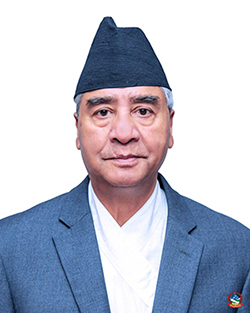Biography
Sher Bahadur Deuba was born in 13 June, 1946 in Ashigram, a remote village in Dadeldhura district of Far-western Province. He received his primary education from Ashigram Primary School and completed his secondary education from Mahendra Higher Secondary School and Sitaram Higher Secondary School in Doti district. After completing SLC, Deuba was enrolled in the Tri-Chandra College for higher education.
He is married to Arzu Rana Deuba and has a son Jaiveer Singh Deuba.
 Deuba registered at the London School of Economics in 1989, however, when he was in London the 1990 Revolution broke out where he campaigned for the revolution which dissolved the party-less Panchayat System and steered the beginning of multiparty democracy.
Deuba registered at the London School of Economics in 1989, however, when he was in London the 1990 Revolution broke out where he campaigned for the revolution which dissolved the party-less Panchayat System and steered the beginning of multiparty democracy.
He began his political career as a student and alongside others founded the Nepal Student Union, a student wing of the Nepali Congress. From 1971 to 1980, he served as the President of the student wing.
During the 1960s and 1970s, Deuba was jailed intermittently for nine years for working against the Panchayat system.
In the next year’s General Elections, he was elected to the House of Representatives from Dadeldhura 1. He served as the Minister of Home Affairs in the cabinet of Girija Prasad Koirala. After Koirala dissolved the parliament and his government was defeated in the 1994 mid-term elections, Deuba was elected parliamentary party leader of the Nepali Congress.
After Manmohan Adhikari tried to dissolve the parliament again in 1995 which was declared unconstitutional by the Supreme Court, Deuba was appointed Prime Minister in 1995 and led a coalition government with the Rastriya Prajatantra Party.
On 12 February 1996, he signed the Mahakali treaty with the Government of India regarding the development of the watershed of the Mahakali River.
His administration, which witnessed the beginning of the Maoist insurgency, fell in March 1997 and he was succeeded by Lokendra Bahadur Chand who led a minority coalition government.
His second premiership started in July 2001 amidst the rise of the Maoists and he later declared a state of emergency and listed the Communist Party of Nepal (Maoist) as a “terrorist organisation”. He was dismissed by King Gyanendra in October 2002, but after huge opposition by general public for restoration of democratically elected Prime Minister, he was reappointed Prime Minister in June 2004. He was arrested after 2005 coup d’état by the King Gyanendra, and was released in February 2006 after the Supreme Court of Nepal gave decision against his unlawful arrest.
Deuba was sworn in as prime minister for a fourth stint in June 2017, as per an agreement to form a rotational government by Congress and CPN (Maoist Centre). His government successfully conducted the elections of all three levels of government in different phases in 2017. On 12 July 2021, the Supreme Court ordered the appointment of Deuba as prime minister within 28 hours, and he was appointed prime minister for a fifth term by President Bidya Devi Bhandari in accordance with Article 76(5) of the Constitution of Nepal the next day.
Education
- Research Fellow in Political Science at the London School of Economics 1989-90
- Master in Arts, Political Science (Humanities) from Tribhuvan University, Kathmandu
- Bachelor’s Degree in Law from Tribhuvan University
- Bachelors in Arts (Humanities) from Tribhuvan University
- Honorary Doctorate Degree: Jawaharlal Nehru University, India